统考大学英语B考试大纲(2013年修订版)
- 格式:docx
- 大小:29.67 KB
- 文档页数:10
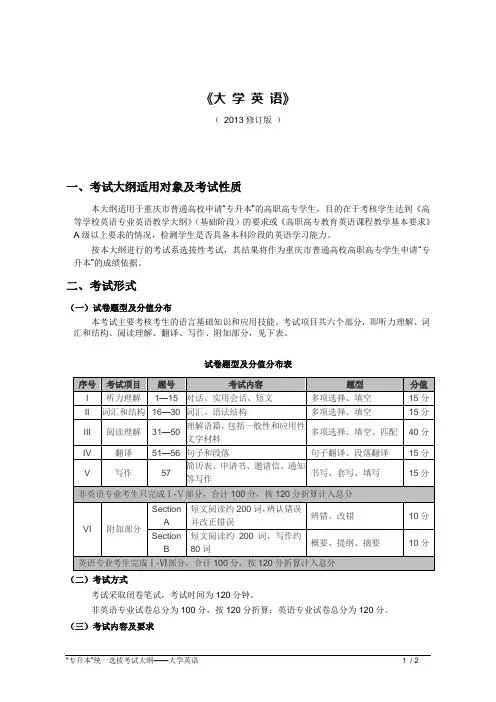
《大学英语》(2013修订版)一、考试大纲适用对象及考试性质本大纲适用于重庆市普通高校申请“专升本”的高职高专学生,目的在于考核学生达到《高等学校英语专业英语教学大纲》(基础阶段)的要求或《高职高专教育英语课程教学基本要求》A级以上要求的情况,检测学生是否具备本科阶段的英语学习能力。
按本大纲进行的考试系选拔性考试,其结果将作为重庆市普通高校高职高专学生申请“专升本”的成绩依据。
二、考试形式(一)试卷题型及分值分布本考试主要考核考生的语言基础知识和应用技能。
考试项目共六个部分,即听力理解、词汇和结构、阅读理解、翻译、写作、附加部分,见下表。
试卷题型及分值分布表(二)考试方式考试采取闭卷笔试,考试时间为120分钟。
非英语专业试卷总分为100分,按120分折算;英语专业试卷总分为120分。
(三)考试内容及要求(一)听力理解(Part ⅠListening Comprehension)考核考生理解所听对话、会话和短文的能力。
听力材料语速为每分钟130词。
听力材料为一般语言材料和实用交流材料。
本部分共15小题,分值15分,题型为多项选择题和填空题。
(二)词汇和结构(Part Ⅱ Vocabulary & Structure)考核考生词汇和语法结构的运用能力。
本部分共15小题,分值15分,题型为多项选择题和填空题。
(三)阅读理解(Part Ⅲ Reading Comprehension)考核考生通过阅读获取信息的能力。
阅读内容为一般阅读材料和常见实用性文字材料。
本部分共4篇短文,总词汇量约1300词,共20小题,分值40分,题型为多项选择题,填空题和匹配题。
其中前2篇阅读材料共10小题,分值20分,题型为多项选择题; 第三篇阅读材料共5小题,分值10分,题型为填空题; 第四篇阅读材料共5小题,分值10分,题型为匹配题。
(四)翻译(Part Ⅳ Translation)考核学生英汉互译能力。
本部分由汉译英和英译汉两部分组成。
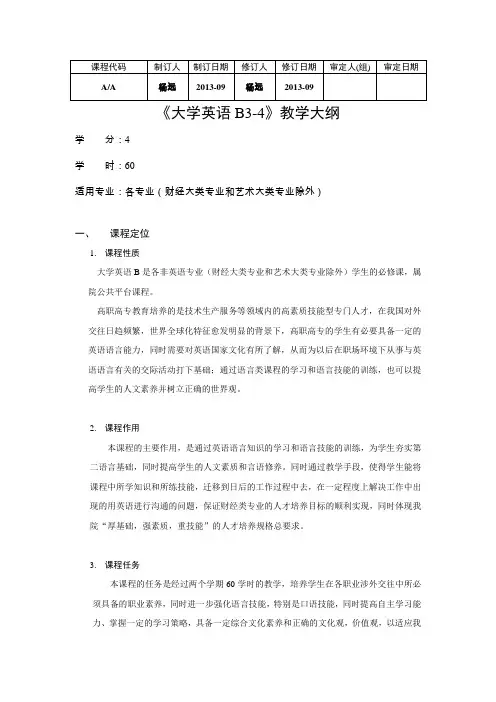
《大学英语B3-4》教学大纲学分:4学时:60适用专业:各专业(财经大类专业和艺术大类专业除外)一、课程定位1.课程性质大学英语B是各非英语专业(财经大类专业和艺术大类专业除外)学生的必修课,属院公共平台课程。
高职高专教育培养的是技术生产服务等领域内的高素质技能型专门人才,在我国对外交往日趋频繁,世界全球化特征愈发明显的背景下,高职高专的学生有必要具备一定的英语语言能力,同时需要对英语国家文化有所了解,从而为以后在职场环境下从事与英语语言有关的交际活动打下基础;通过语言类课程的学习和语言技能的训练,也可以提高学生的人文素养并树立正确的世界观。
2.课程作用本课程的主要作用,是通过英语语言知识的学习和语言技能的训练,为学生夯实第二语言基础,同时提高学生的人文素质和言语修养。
同时通过教学手段,使得学生能将课程中所学知识和所练技能,迁移到日后的工作过程中去,在一定程度上解决工作中出现的用英语进行沟通的问题,保证财经类专业的人才培养目标的顺利实现,同时体现我院“厚基础,强素质,重技能”的人才培养规格总要求。
3.课程任务本课程的任务是经过两个学期60学时的教学,培养学生在各职业涉外交往中所必须具备的职业素养,同时进一步强化语言技能,特别是口语技能,同时提高自主学习能力、掌握一定的学习策略,具备一定综合文化素养和正确的文化观,价值观,以适应我国经济发展和国际交流的需要。
二、课程设计1.课程设计理念①本课程是大学英语的拓展部分,与大学英语基础部分共同组成大学英语的课程体系;②拓展部分的课程,主要以培养学生职业素养为主,兼顾语言学习;③在培养方法上,强调以人为本,以能力为本位,突出职业核心能力的培养和训练;④加强第二课堂的建设和学习兴趣的培养;⑤在课程实施过程中,坚持学做合一,教学合一,将知识和技能充分融合,将教与学的过程紧密联系;⑥加强学生学习过程的控制,强调自主学习能力的培养和学习策略的培养;⑦坚持多元评价模式,坚持形成性评估在课程评价中的作用;2.课程设计思路本课程主要分为课内学习和课外学习两大部分。
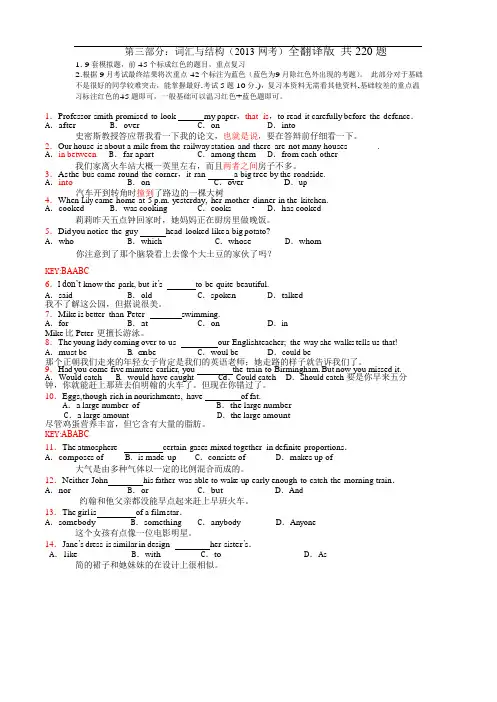
第三部分:词汇与结构(2013 网考)全翻译版共220 题1.9 套模拟题,前45 个标成红色的题目,重点复习2.根据9 月考试最终结果将次重点42 个标注为蓝色(蓝色为9 月除红色外出现的考题)。
此部分对于基础不是很好的同学较难突击,能掌握最好.考试5 题10 分.),复习本资料无需看其他资料,基础较差的重点温习标注红色的45 题即可,一般基础可以温习红色+蓝色题即可。
1.Professor smith promised to look my paper,that is,to read it carefully before the defence.A.after B.over C.on D.into史密斯教授答应帮我看一下我的论文,也就是说,要在答辩前仔细看一下。
2.Our house is about a mile from the railway station and there are not many houses .A.in between B.far apart C.amon g them D.fr om each other我们家离火车站大概一英里左右,而且两者之间房子不多。
3.As t he bus came round the corner,it ran a big tree by the roadside.A.into B.on C.over D.up汽车开到转角时撞到了路边的一棵大树4.When Lily came home at 5 p.m. yesterday, her mother dinner in the kitchen.A.cooked B.wa s cooking C.cooks D.has cooked莉莉昨天五点钟回家时,她妈妈正在厨房里做晚饭。
5.Did you notice the guy head looked like a big potato?A.wh o B.wh ich C.wh ose D.wh om你注意到了那个脑袋看上去像个大土豆的家伙了吗?KEY:BAABC6.I don’t know the park, but it’s to be quite beautiful.A.said B.old C.spok en D.t alk e d我不了解这公园,但据说很美。
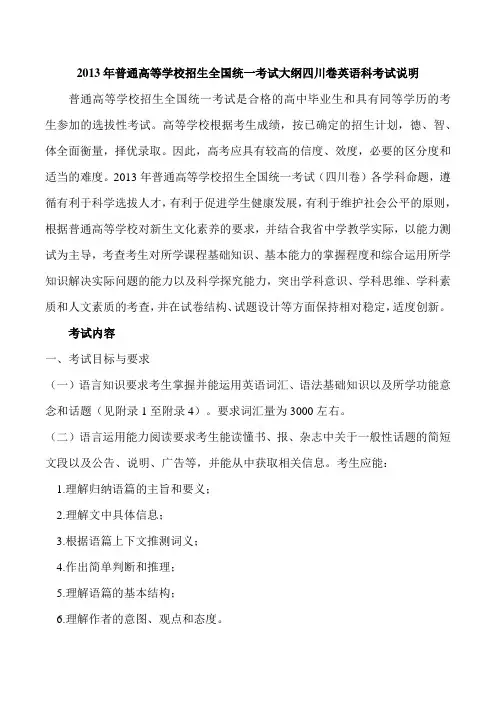
2013年普通高等学校招生全国统一考试大纲四川卷英语科考试说明普通高等学校招生全国统一考试是合格的高中毕业生和具有同等学历的考生参加的选拔性考试。
高等学校根据考生成绩,按已确定的招生计划,德、智、体全面衡量,择优录取。
因此,高考应具有较高的信度、效度,必要的区分度和适当的难度。
2013年普通高等学校招生全国统一考试(四川卷)各学科命题,遵循有利于科学选拔人才,有利于促进学生健康发展,有利于维护社会公平的原则,根据普通高等学校对新生文化素养的要求,并结合我省中学教学实际,以能力测试为主导,考查考生对所学课程基础知识、基本能力的掌握程度和综合运用所学知识解决实际问题的能力以及科学探究能力,突出学科意识、学科思维、学科素质和人文素质的考查,并在试卷结构、试题设计等方面保持相对稳定,适度创新。
考试内容一、考试目标与要求(一)语言知识要求考生掌握并能运用英语词汇、语法基础知识以及所学功能意念和话题(见附录1至附录4)。
要求词汇量为3000左右。
(二)语言运用能力阅读要求考生能读懂书、报、杂志中关于一般性话题的简短文段以及公告、说明、广告等,并能从中获取相关信息。
考生应能:1.理解归纳语篇的主旨和要义;2.理解文中具体信息;3.根据语篇上下文推测词义;4.作出简单判断和推理;5.理解语篇的基本结构;6.理解作者的意图、观点和态度。
(三)写作要求考生根据提示进行书面表达,考生应能:1.准确使用语法和词汇;2.使用一定的句型和词汇,清楚、连贯地表达自己的意思。
二、考试范围及要求考生修完必修1~5模块及选修6、7模块所达到的《普通高中英语课程标准(实验)》规定的八级目标要求。
考试形式与试卷结构一、考试时间考试限定时间120分钟。
二、分值分布试卷满分150分,其中选择题90分,非选择题60分。
三、难易比例试卷包括容易题、中等难度题和难题,以中等难度题为主。
四、试卷结构、题型、时间分布等试卷由第Ⅰ卷和第Ⅱ卷两部分构成。
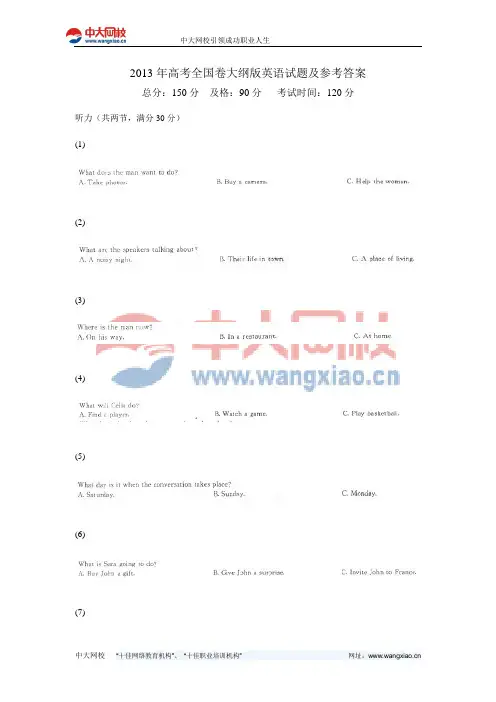
2013年高考全国卷大纲版英语试题及参考答案总分:150分及格:90分考试时间:120分听力(共两节,满分30分)(1)(2)(3)(4)(5)(6)(7)(8)(9)(10)(11)(12)(13)(14)(15)(16)(17)(18)(19)(20)单项填空(共15小题;每小题1分,满分15分) (1)(2)(3)(4)(5)(6)(7)(8)(10)(11)(12)(13)(14)(15)完形填空。
(每小题1. 5分)(1) 根据资料回答第{TSE}题。
{TS}</p><p>(2)(3)(4)(5)(6)(7)(8)(9)(10)(11)(12)(13)(14)(15)(16)(17)(18)(19)(20)阅读理解。
(每小题2分)(1) 根据资料回答第{TSE}题。
</p><p>{TS}</p><p>(2)(3)(4)(5) 根据资料回答第{TSE}题。
</p><p>{TS}</p><p>(6)(7)(8)(9)根据资料回答第{TSE}题。
{TS}<p>(10)(11)(12)(13) 根据资料,回答第{TSE}题。
</p><p>{TS}What are you advised to do for your mother at doctor's visits?A. Take notes.B. Be with her.C. Buy medicine.D. Give her gifts.(14)What can be a gift of organization for your mother?A. Keeping her medical information together.B. Buying all gifts for her from one company.C. Making a list of her medical check-ups.D. Storing her medicines in a safe place.(15)Where can you find a gift idea to improve your mother’s s leep?A. In Gift No. 1.B. In Gift No. 2.C. In Gift No. 3.D. In Gift No. 4.(16)Buying gifts from Presents for Purpose allows mothers toA. enjoy good sleepB. be well-organizedC. bet extra supportD. give others help(17)根据资料,回答第{TSE}题。
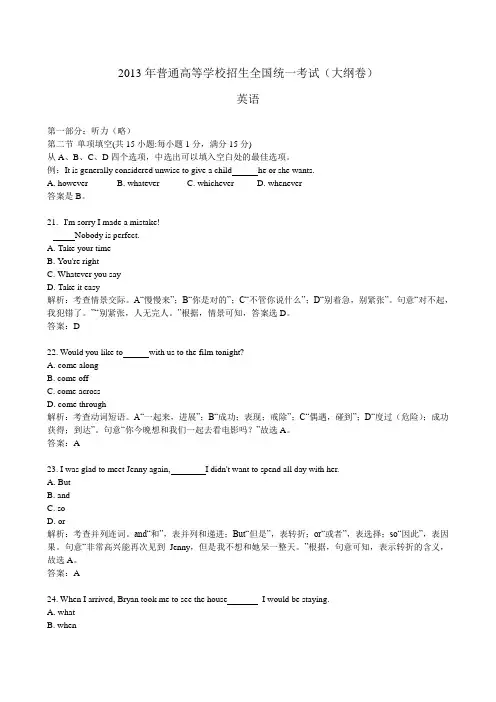
2013年普通高等学校招生全国统一考试(大纲卷)英语第一部分:听力(略)第二节单项填空(共15小题:每小题1分,满分15分)从A、B、C、D四个选项,中选出可以填入空白处的最佳选项。
例:It is generally considered unwise to give a child he or she wants.A. howeverB. whateverC. whicheverD. whenever答案是B。
21.--I'm sorry I made a mistake!-- Nobody is perfect.A.Take your timeB.You're rightC.Whatever you sayD.Take it easy解析:考查情景交际。
A“慢慢来”;B“你是对的”;C“不管你说什么”;D“别着急,别紧张”。
句意“对不起,我犯错了。
”“别紧张,人无完人。
”根据,情景可知,答案选D。
答案:D22. Would you like to with us to the film tonight?A. come alongB. come offC. come acrossD. come through解析:考查动词短语。
A“一起来,进展”;B“成功;表现;戒除”;C“偶遇,碰到”;D“度过(危险);成功获得;到达”。
句意“你今晚想和我们一起去看电影吗?”故选A。
答案:A23. I was glad to meet Jenny again, I didn't want to spend all day with her.A. ButB. andC. soD. or解析:考查并列连词。
and“和”,表并列和递进;But“但是”,表转折;or“或者”,表选择;so“因此”,表因果。
句意“非常高兴能再次见到Jenny,但是我不想和她呆一整天。
”根据,句意可知,表示转折的含义,故选A。
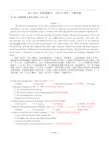
第二部分阅读理解(2)(2013 年网考)全翻译版新大纲9 套模拟题18 篇阅读理解(必考一篇)。
Passage 1The French Revolution broke out in 1789. At the time France was in a crisis. The government was badly run and people’s lives were miserable. King Louis XIV tried to control the national parliament and raise more taxes. But his effort failed. He ordered his troops to Versailles. The people thought that Louis intended to put down the Revolution by force. On July 14,1789, they stormed and took the Bastille, where political prisoners 1792 to get support from Austria and Prussia. However, he was caught and put in prison. In September 17were kept. Ever since that day, July 14 has been the French National Day. Louis tried to flee the country in 92, the monarchy was abolished. In the same year, Louis was executed. A few months later his wife, Marie also had her head cut off. The Revolution of France had frightened the other kings of Europe. Armies from Austria and Prussia began to march against France. The French raised republican armies to defend the nation. The Revolution went through a period of terror. Thousands of people lost their lives. In the end, power passed to Napoleon Bonaparte. (190 words)法国大革命于 1789 年爆发。
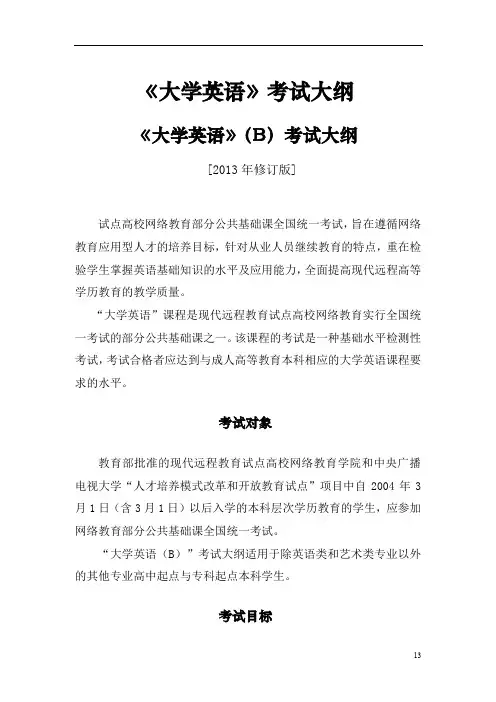
《大学英语》考试大纲《大学英语》(B)考试大纲[2013年修订版]试点高校网络教育部分公共基础课全国统一考试,旨在遵循网络教育应用型人才的培养目标,针对从业人员继续教育的特点,重在检验学生掌握英语基础知识的水平及应用能力,全面提高现代远程高等学历教育的教学质量。
“大学英语”课程是现代远程教育试点高校网络教育实行全国统一考试的部分公共基础课之一。
该课程的考试是一种基础水平检测性考试,考试合格者应达到与成人高等教育本科相应的大学英语课程要求的水平。
考试对象教育部批准的现代远程教育试点高校网络教育学院和中央广播电视大学“人才培养模式改革和开放教育试点”项目中自2004年3月1日(含3月1日)以后入学的本科层次学历教育的学生,应参加网络教育部分公共基础课全国统一考试。
“大学英语(B)”考试大纲适用于除英语类和艺术类专业以外的其他专业高中起点与专科起点本科学生。
考试目标本考试旨在考查现代远程教育所有专业(除英语类和艺术类专业)的学生掌握英语基础知识的水平及应用能力。
考生应掌握基本的英语语法知识和词汇,具备运用不同语言技能进行交际的基本能力。
考试内容与要求【语法】考生应较好地掌握基本的英语语法知识,并能在交际中较正确地加以运用。
【词汇】考生应认知3000个单词,并熟练掌握其中的1 800个单词及其基本的搭配。
【交际能力】考生应掌握日常生活常见情景中的基本交际用语。
【阅读】考生应能基本读懂与日常生活和社会活动相关的不同类型的文字材料,阅读速度为每分钟50个单词。
考生应能:1.理解主旨要义;2.理解文中具体信息;3.根据上下文推测生词词义;4.进行有关的判断、推理和引申,理解作者的意图、观点或态度。
【翻译】考生应能在规定时间内将难度适中的英文句子翻译成中文。
考生应能:1. 对英语原文有准确的理解;2. 做到译文通顺、达意。
【写作】考生应能在规定时间内写出长度不少于80词的短文。
考生应能:1.用较正确的语法、词汇、拼写、标点进行表达;2.基本做到内容切题,条理清楚;3.根据不同的写作目的进行有针对性的写作。
![2013年全国英语学科新课标版《考试大纲》、《考试说明》解读及复习建议[五篇材料]](https://uimg.taocdn.com/8770277b326c1eb91a37f111f18583d049640f6c.webp)
2013年全国英语学科新课标版《考试大纲》、《考试说明》解读及复习建议[五篇材料]第一篇:2013年全国英语学科新课标版《考试大纲》、《考试说明》解读及复习建议安徽省2013年高考英语新课标版《考试大纲》、《考试说明》解读及复习建议一、《考试大纲》2013年全国新课标版《考试大纲》英语学科与2012年的《考试大纲》相比,在考试内容和要求、时间、分值、题型题量等方面都没有发生变化。
词汇量要求仍为3500左右(各省、自治区或直辖市可以根据本地实际情况在考试说明中对词汇量进行适当调整,但是不得低于2500个单词;同时,应该制定计划,在一定时间内分期、分批增加至3500个单词)。
基于考生的实际情况,《考纲说明》将《考试大纲》附录词汇表单词量压缩到了3000个左右,作为高考命题的词汇范围,并为命题需要增加了个别带星号的、仅要求考生知道其意思的单词。
《考试大纲》中对考生的语言运用能力(听力,阅读理解,写作)考查标准无变化。
试卷形式、结构以及参考试卷等均无变化,说明2013年全国课标版试卷的命制将在总体上和思路上与2012年高考试卷保持一致。
2013年高考英语考试的题型仍包括听力、英语知识运用、阅读理解和写作四大类型,分别考查考生对英语基础知识的掌握和运用情况及英语听、读、写几方面的能力。
二、《考试说明》——“命题词汇范围增加100个”变化解读1、英语科目最新的变化体现在对词汇量的要求上。
2012年考试说明显示,高考命题词汇范围在3000个左右,今年则提升到3100个左右,并在附录词汇表中增加了50个新词。
仔细研究这些词汇,我们会发现这些新增词汇生活气息很浓,实用性很强,比如说awesome这个词在口语中就可以表示“太棒了,了不起”的意思,再比如aggressive这个词现在常用来形容一个人有进取心,有冲劲,buffet自助餐,corrupt 腐败的,radiation辐射等这些新增词反映了今年高考对考生语言运用能力和表达能力提出了新的要求。
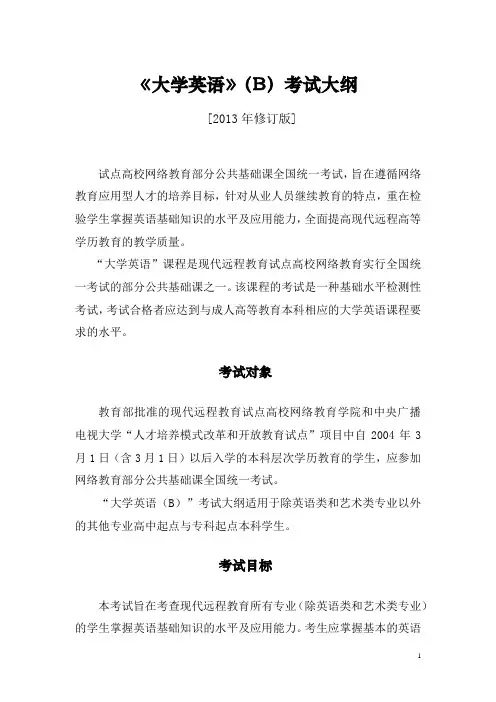
《大学英语》(B)考试大纲[2013年修订版]试点高校网络教育部分公共基础课全国统一考试,旨在遵循网络教育应用型人才的培养目标,针对从业人员继续教育的特点,重在检验学生掌握英语基础知识的水平及应用能力,全面提高现代远程高等学历教育的教学质量。
“大学英语”课程是现代远程教育试点高校网络教育实行全国统一考试的部分公共基础课之一。
该课程的考试是一种基础水平检测性考试,考试合格者应达到与成人高等教育本科相应的大学英语课程要求的水平。
考试对象教育部批准的现代远程教育试点高校网络教育学院和中央广播电视大学“人才培养模式改革和开放教育试点”项目中自2004年3月1日(含3月1日)以后入学的本科层次学历教育的学生,应参加网络教育部分公共基础课全国统一考试。
“大学英语(B)”考试大纲适用于除英语类和艺术类专业以外的其他专业高中起点与专科起点本科学生。
考试目标本考试旨在考查现代远程教育所有专业(除英语类和艺术类专业)的学生掌握英语基础知识的水平及应用能力。
考生应掌握基本的英语语法知识和词汇,具备运用不同语言技能进行交际的基本能力。
考试内容与要求【语法】考生应较好地掌握基本的英语语法知识,并能在交际中较正确地加以运用。
【词汇】考生应认知3000个单词,并熟练掌握其中的1 800个单词及其基本的搭配。
【交际能力】考生应掌握日常生活常见情景中的基本交际用语。
【阅读】考生应能基本读懂与日常生活和社会活动相关的不同类型的文字材料,阅读速度为每分钟50个单词。
考生应能:1.理解主旨要义;2.理解文中具体信息;3.根据上下文推测生词词义;4.进行有关的判断、推理和引申,理解作者的意图、观点或态度。
【翻译】考生应能在规定时间内将难度适中的英文句子翻译成中文。
考生应能:1. 对英语原文有准确的理解;2. 做到译文通顺、达意。
【写作】考生应能在规定时间内写出长度不少于80词的短文。
考生应能:1.用较正确的语法、词汇、拼写、标点进行表达;2.基本做到内容切题,条理清楚;3.根据不同的写作目的进行有针对性的写作。
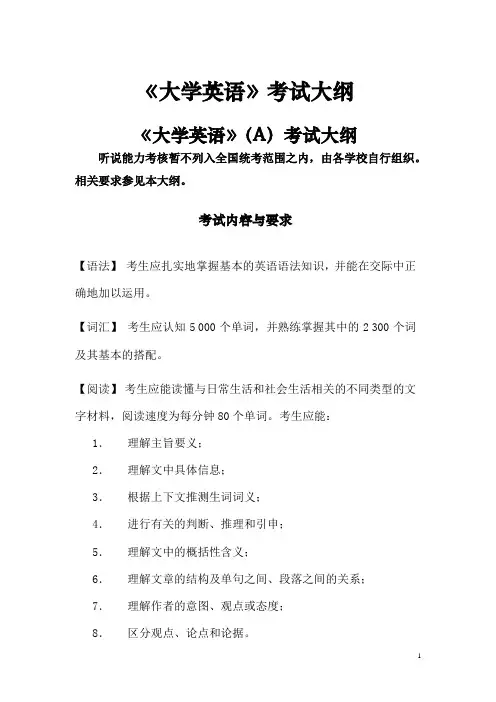
《大学英语》考试大纲《大学英语》(A)考试大纲听说能力考核暂不列入全国统考范围之内,由各学校自行组织。
相关要求参见本大纲。
考试内容与要求【语法】考生应扎实地掌握基本的英语语法知识,并能在交际中正确地加以运用。
【词汇】考生应认知5000个单词,并熟练掌握其中的2300个词及其基本的搭配。
【阅读】考生应能读懂与日常生活和社会生活相关的不同类型的文字材料,阅读速度为每分钟80个单词。
考生应能:1.理解主旨要义;2.理解文中具体信息;3.根据上下文推测生词词义;4.进行有关的判断、推理和引申;5.理解文中的概括性含义;6.理解文章的结构及单句之间、段落之间的关系;7.理解作者的意图、观点或态度;8.区分观点、论点和论据。
【翻译】考生应能在规定的时间内将难度适中的中文句子翻译成英语。
考生应能:1.用正确的语法、词汇、拼写、标点等进行表达;2.做到译文通顺、达意。
【写作】考生应能在规定时间内写出长度不少于150词的短文。
考生应能:1.用正确的语法、词汇、拼写、标点进行表达;2.内容切题,结构严谨,条理清楚;3.遵循文章的一般文体格式;4.根据不同的写作目的进行有针对性的写作。
【听力】考生应能听懂日常生活以及社会生活中的一般性谈话,平均语速为每分钟140个单词。
考生应能:1.理解主旨要义;2.获取事实性的具体信息3.了解明确表达的概括性含义;4.进行有关的判断、推理和引申;5.理解说话者的意图、观点或态度。
【口语】考生应能就日常生活和工作中的常见情景进行对话,表达个人意见、观点和态度。
考生应能:1.根据特定场景进行较为有效、得体的口头交际;2.基本连贯地进行较长的表述;3.做到语音、语调基本正确,无重大语法错误,语言较为流畅;4.主动交流,并能恰当地使用交际策略。
试卷结构与题型考试方式与时间考试为机考闭卷考试,满分为100分,时间为90分钟。
题型示例大学英语(A)模拟试卷Information for the Examinees:This examination consists of FOUR parts. They are:Section I Reading Comprehension (20 points, 25 minutes)Section II Vocabulary and Grammar (40 points, 20 minutes)Section III Translation (20 points, 20 minutes)Section IV Writing (20 points, 25 minutes)The total score for this examination is 100. The time allowed for this examination is 90 minutes.Section I: Reading Comprehension [20 points]Part 1: Questions 1-5 are based on this part. (10 points)Read the following passage and choose the best answer from A, B, C and D.Manhattan Island is the oldest and most important of the five boroughs that make up New York City. It is 21.7 kilometers long and 3.8 kilometers wide at its widest point. It contains New York’s tallest buildings as well as some of the largest schools and colleges, and the most famous financial and theater districts in the United States. It has skyscrapers and Central Park, the old and the new, the best and the worst. It is like no other big city. It is unique.To understand Manhattan, we must know something of its early history: its early days of Dutch colonists and English settlers; the waves of the nineteenth-century European immigrants who arrived at its shores; the African-Americans who moved north after the Civil War; recent immigrants from China and other parts of Asia; and young people who go to New York from all over America. It is a mix of ethnic groups and cultures, successes and failures, hopes and fears.The United States is a nation of immigrants and no other city displays this fact as well as New York City. From Chinatown and Little Italy to Harlem, New York is a place where communities take pride in retaining their ethnicity. Most immigrants went to America with very little money. America gave them hope and a new beginning. Millions of immigrants have prospered in America.On July 4, 1884, the people of France gave to the United States as a symbol of friendship, a statue sculptured by Frederic Auguste Bartholdi. This statue was placed on an island in New York Harbor. It is 46 meters high and was the first sight immigrants saw as they came into New York City by ship. It is known as the Statue of Liberty. On the statue is a poem written by Emma Lazarus. This poem sums up the American tradition of accepting people from other countries. It reads as follows:Give me your tired, your poor,Your huddled masses yearning to breathe free,The wretched refuse of your teeming shore.Send these, the homeless, tempest-tossed to me,I lift my lamp beside the golden door!1. What was the first sight immigrants on incoming ships saw as they entered New York Harbor?A.Chinatown.B.Central Park.C.Harlem.D.The Statue of Liberty.2. Emma Lazarus’ poem says that America is a place _________________.A.where poor and unfortunate people are welcomeB.where there is fortune for people coming from other parts of the worldC.where there is garbage and litter on the shoreD.where there is a big light for people to get together..5.Part 2: Questions 6- 10 are based on this part. (10 points)Read the following passage and choose the best answer from A, B, C and D.(题型示例参见Part 1)6...10.Section II: Vocabulary and Grammar [40 points]Part 1: Questions 11- 20 are based on this section. (20 points)Read the following sentences and choose the best answer from A, B, C and D.11. Mary did her work ______ the manager had instructed.A.asA.untilB.whenC.though12. The boss gave orders that nothing ________ touched until the police arrived here.A.should beB.ought to beC.must beD.would be13. _________ of the twins went out of town because I saw both at my brother’s party last night.A.NoneB.BothC.NeitherD.All...20.Part 2: Questions 21 - 30 are based on this section. (20 points)Read the following passage and fill in each blank by choosing the best answer from A, B, CMore and more people have to install burglar alarms in their houses if they want to get insurance. Insurance companies _______ (21) people in certain areas to install the alarms before they will give them insurance for the past year. This is ________ (22) to increasing crimes in some parts of the country. This can be a problem for people who are struggling to make _______ (23) ends meet. The alarms, _________ (24) can be very expensive, need to be installed by an electrician. It is _______ (25) that 20% of homes have alarms installed, and another 20% of people plan to have them installed, but have not installed them yet. The insurance companies ______ (26) people to install the alarms on all doors and windows.…21.A. have been askingB. have been askedC. had been askingD. had been asked22.A. causedB. becauseC. dueD. resulted23.A. / (不用填)B. theC. allD. their24.A. whoB. thatC. whereD. which25.A. estimateB. estimatingC. estimatedD. being estimated26. A. warnedB. toldC. suggestedD. reminded...30.Section III: Translation [20 points]Questions 31-34 are based on this section.Translate the following sentences into English.31.我选择网络教育的主要原因是其灵活性。
2013年高考英语考试大纲(新课标)April(apr) Thursday(thurs) May(may) Friday(fri) June(jun) Saturday(sat) July(jul) Sunday(sun) September(sept)October(oct)November(nov)December(dec)Ⅰ、考试性质普通高等学校招生全国统一考试是由合格的离中华业生和具有同等学力的考生参加的选拔性考试。
高等学校根据考生的成绩,按已确定的招生计划,德、智、体全面衡量,择优录取。
因此.离考应有较高的信度、效度,适当的难度和必要的区分度。
Ⅱ.考试的内容和要求根据普通高等学校对新生文化素质的要球,依据中华人民共和国教育部2003年颁布的《普通高中课程方案(实验)》和《普通高中英语课程标准(实验)》,确定本学科考试内容。
考核目标与要求一、语言知识要求考生掌握并能运用英语语音、词汇、语法基础知识以及所学功能意念和话题(见附录1至附录5),要求词汇量为3500左右.二、语言运用1.听力要求考生能听懂所熟悉话题的简短独白和对话。
考生应能:(1)理解主旨和要义(2)获取具体的、事实性信息(3)对所听内容作出推断(4)理解说话者的意图、观点和态度2.阅读要求考生能读懂书、报、杂志中关于一般性话题的简短文段以及公告、说明、广告等,并能从中获取相关信息。
考生应能:(1)理解主旨和要义(2)理解文中具体信息(3)根据上下文推断生词的词义(4)做出判断和推理(5)理解文章的基本结构(6)理解作者的意图、观点和态度3.写作要求考生根据题式进行书面表达。
考生应能:(1)清楚、连贯地传递信息,表达意思(2)有效的运用所学语言知识4.口语要求考生根据题式进行口头表达。
考生应能:(1)询问或传递实施性信息,表达意思和想法(2)做到语音、语调自然(3)做到语言运用得体(4)使用有效的交际策略、附录1 语音项目表1.基本读音(1)26个字母的读音(2)元音字母在重读音节中的读音(3)元音字母在轻读音节中的读音(4)元音字母组合在重读音节中的读音(5)辅音字母组合的读音(6)辅音连缀的读音(7)成音节的读音2.重音(1)单词重音(2)句子重音3.读音的变化(1)连读(2)失去爆破(3)弱读(4)同化4.语调与节奏(1)意群与停顿(2)语调(3)节奏5.语音、语调、重音、节奏等在口语交流中的运用6.朗读和演讲中的语音技巧7.重要英语国家的英语语音差异. 各省(自治区、直辖市)可以根据本地实际情况在《考试说明》中对词汇量进行适当调整,但不得低于2500个单词;同时,应制定计划,在一定时间内分期、分批量增加至3500个单词。
请各位同学登录网站下载机考练习系统,本次考试在时间和题量上发生了一些变化,题型没有变化。
整体来看,考试难度有所降低。
请大家认真熟悉机考系统的各项操作,以免考试发生操作失误。
此外,打字速度较慢的同学需要练一练,因为作文也需要在网上完成。
下面是此次考试的基本信息,供大家参考。
一、考试时间: 考试总时间90分钟,满分100分二、考试科目: 大学英语B三、考试内容:第一部分:英语知识运用(共5小题;每小题3分,满分15分)此部分共有5个未完成的对话,针对每个对话中未完成的部分有4个选项,请你从A、B、C、D四个选项中,用鼠标点击正确选项。
第二部分:阅读理解(共10小题;每小题3分,满分30分)此部分共有2篇短文,每篇短文后有5个问题,每个问题后有4个选项,请你从A、B、C、D四个选项中,选出可以填入空白处的最佳选项,用鼠标点击正确选项。
第三部分:词汇和结构(共15小题;满分35分)第一节:此小节共有5个未完成的句子,针对每个句子中未完成的部分有4个选项,请你从A、B、C、D四个选项中,选出可以填入空白处的最佳选项,用鼠标点击正确选项。
(共5小题;每小题3分,满分15分)第二节:此小节的短文中共有10个空白处,针对每个空白处有4个选项,请你从A、B、C、D四个选项中,选出可以填入空白处的最佳选项,用鼠标点击正确选项。
(共10小题;每小题2分,满分20分)第四部分:写作(满分20分)要求你在30分钟内,根据下面所给的题目用英语写出一篇不少于80词的短文。
四、注意事项:1.考生可以通过重做功能,重新初始化本题。
重新初始化后必须重新做本题,否则本题得分为0分。
2.考生在考试中应严格按照考试系统要求操作,不得擅自进行冷、热启动、复位、刷新网页及其他与考试无关的任何操作。
凡未按要求操作的,一切后果由考生自负;考试结束后,考生应按系统提示迅速离开考场。
《大学英语B》统考应试指导一、分析考试任何考试都有自身特点,考试前要求必须彻底了解考试的基本信息:包括考核目的、词汇量、题型设置、题量、考试时间以及形式等基本信息。
全国高校网络教育大学英语统考(B)试题及答案Test 1Part I 日常会话1. –Hello, may I talk to the headmaster now?--AA. Sorry, he is busy at the momentB. No, you can ‘tC. Sorry, you can ‘tD. I don ‘tknow2.-- Do you think I could borrow your dictionary?--.CA. Yes, you may borrowB. Yes, go onC. Yes, help yourselfD. It doesn‘tmatter3.-- Is that Mr Robert Lee?--AA. Yes, Lee speaking.B. Hello, what do you want?C. Sorry, speaking.D. I don ‘tknow.4.–Excuse me, sir. Where is Dr. Brown ‘s office?-- D.A. You can ‘task meB. Pardon? I have no ideaC. Please don‘tsay soD. Sorry, I don ‘tknow, but you can ask the man over there5. –Mary, your dress is really beautiful. How is John?--.CA. Thank you very muchB. No, no, John is not badC. Thank you. He is fineD. Don ‘tsay that. It‘s ugly. John is good6.–What can I do for you, madam?--.AA. I want a kilo of applesB. You can go your own wayC. ThanksD. Excuse me. I ‘m busy7.–I ‘d like to take you to the coffee house on the corner.--.BA. Thank you. You shouldn ‘tdo thatB. Thanks, I ‘dlike to go with youC. No, you can ‘tsay soD. No, no. You can ‘tdo that8.–Do you mind telling me where you‘re from?--.DA. Certainly.I ‘m from LondonB. Sure. I was born in LondonC. Not really, you can do itD. Certainly not. I ‘m from London9. –May I see the menu, please?--CA. That is the menu, sir.B. Yes, please go on.C. Here you are, sir.D. Of course, sir.10. –I was worried about chemistry, but Mr Brown gave me an A !--.BA. Don ‘tworry about itB. Congratulations! That ‘s a difficult courseC. Mr Brown is very goodD. Good luck to you!Part I I阅读理解Passage 1There are stories about two U.S. presidents, Andrew Jackson and Martin Van Buren, which attempt to explain the American English term OK. We don‘tknow if either story is true, but they are both interesting.The first explanation is based on the fact that President Jackson had very little education. In fact, he had difficulty reading and writing. When important papers came to Jackson, he tried to read them and then had his assistants explain what they said. If he approved of a paper, he would write ―all correct‖on it. The problem was that he didn ‘tknow how to spell, so what he really wrote was ―ol korekt ‖. After a while, he shortened that term to ―OK‖.The second explanation is based on the place where President Van Buren was born, Kinderhook, New York. Van Bruen‘s friends organized a club to help him become President. They called the club the Old Kinderhook Club, and anyone who supported Van Buren was called―OK‖.11.The author C .A. believes both of the storiesB. doesn‘tbelieve a word of the storiesC. is not sure whether the stories are trueD. is telling the stories just for fun12.According to the passage, President Jackson D.A. couldn ‘tdraw up any documents at allB. didn ‘tlike to read important papers by himselfC. often had his assistants sign documents for himD. wasn ‘tgood at reading, writing or spelling13.According to the first story, the term ―OK ‖C.A. was approved of by President JacksonB. was the title of some official documentsC. was first used by President JacksonD. was an old way to spell ―all correct ‖14.According to the second story, the term ―OK ‖D.A. was the short way to say ―Old Kinderhook Club‖B. meant the place where President Van Buren was bornC. was the name of Van Buren ‘s clubD. was used to call Van Buren ‘s supporters in the election15.According to the second story, the term ―OK ‖was first used B.A. by Van BurenB. in a presidential electionC. to organize the Old Kinderhook ClubD. by the members of the ―Old Kinderhook Club ‖Passage 2Although the United States covers so much land and the land produces far more food thanthe present population needs, its people are by now almost entirely an urban society. Less than a tenth of the people are engaged in agriculture and forestry( 林业 ), and most of the rest live in or around towns, small and large. Here the traditional picture is changing: every small town may stillbe very like other small towns, and the typical small town may represent a widely accepted view of the country, but most Americans do not live in small towns any more. Half the population now lives in some thirty metropolitan areas(large cities with their suburbs ) of more than a millionpeople each –a large proportion than in Germany or English, let alone France. The statistics( 统计 ) of urban and rural population should be treated with caution because so many people who live in areas classified as rural travel by car to work in a nearby town each day. As the rush to live out of town continues, rural areas within reach of towns are gradually filled with houses, so that it is hard to say at what moment a piece of country becomes a suburb. But more and more the typical American lives in a metropolitan rather than a small town environment.16.If now America has 250 million people, how many of them are engaged in agriculture andforestry?CA. About 25 million.B. More than 25 millionC. Less than 25 millionD. Less than 225 million17.Which of the following four countries has the smallest proportion of people living inmetropolitan areas?CA. the United States.B. GermanyC. France.D. England18.What‘s the meaning of the word ―metropolitan ‖in the middle of the passage?AA. Of a large city with its suburbs.B. Of small and large towns.C. Of urban areas.D. Of rural areas.19.According to the passage, what can we learn about small towns in the United States?BA.Most small towns become gradually crowded.B.Small towns are still similar to each other.C.As the traditional picture is changing, towns are different.D.Small towns are turning into large cities.20.Why is it hard to say when a piece of country becomes a suburb?CA.Because they are the same.B.Because the rush takes place too quickly.C.Because the process is gradual.D.Because more and more Americans live in metropolitan areas.Passage 3If we were asked exactly what we were doing a year ago, we should probably have to saythat we could not remember. But if we had kept a book and had written in it an account of whatwe did each day, we should be able to give an answer to the question.It is the same in history. Many things have been forgotten because we do not have any written account of them. Sometimes men did keep a record of the most important happenings in their country, but often it was destroyed by fire or in a war. Sometimes there was never any written record at all because the people of that time and place did not know how to write. For example, we know a good deal about the people who lived in China 4,000 years ago, because they could write and leave written records for those who lived after them. But we know almost nothing about the people who lived even 200 years ago in central Africa, because they had not learned to write.Sometimes, of course, even if the people cannot write, they may know something of the past. They have heard about it from older people, and often songs and dances and stories have been made about the most important happenings, and these have been sung and acted and told for many generations. For most people are proud to tell what their fathers did in the past. This we maycall ?remembered history ‘.Some of it has now been written down. It is not so exact or so valuable to us as written history is, because words are much more easily changed when used again and again in speech than when copied in writing. But where there are no written records, such spoken stories are often very helpful.21.Which of the following ideas is not suggested in the passage?DA.―Remembered history‖, compared with written history, is less reliable.B.Written records of the past play the most important role in our learning of the human history.C.A written account of our daily activities helps us to be able to answer many questions.D. Where there are no written records, there is no history.22.We know very little about the central Africa 200 years ago because D.A. there was nothing worth being written down at that timeB. the people there ignored the importance of keeping a recordC. the written records were perhaps destroyed by a fireD. the people there did not know how to write23.―Remembered history ‖refers to D.A. history based on a person ‘s imaginationB. stories of important happenings passed down from mouth to mouthC. songs and danced about the most important eventsD. both B and C24.―Remembered history ‖is regarded as valuable only when B.A. it is written downB. no written account is availableC. it proves to be trueD. people are interested in it25. The passage suggests that we could have learned much more about our past than we do now ifthe ancient people had A.A. kept a written record of every past eventB. not burnt their written records in warsC. told exact stories of the most important happeningsD. made more songs and dancesPart I I I语法与词汇选择题26. Jean did not have time to go to the concert last night because she wasbusy C for her examination.A. to prepareB. to be preparedC. preparingD. being prepared27. The computer doesn‘twork well. Something C wrong.A. can have goneB. should have goneC. must have goneD. ought to have gone28. Although Mary is satisfied with her success, she wonders C will happen to her privatelife.A. howB. whoC. whatD. that2 9. T h e c o n c er t us u a l l y t ak es p l ac e a t t he P eo p l e ‘s S q uar e, w i t ht h eaudience B on the ground.A. seatingB. seatedC. be seatingD. to seat30. If the whole program D beforehand, a great deal of time and money would have beenA. was not plannedB. were not plannedC. would not be plannedD. had not been planned31.Isn‘tit about the time you A to do morning exercises?A. beganB. beginC. should beginD. have begun32.I am very grateful to you for what you‘ve given me and D you have done for me.A. whichB. thatC. all whatD. all that33.It was not until she had arrived home B remembered her appointment with the doctor.A. when sheB. that sheC. and sheD. she34.Determined to A as if everything were normal, he responded with a kind of indifference.A. carry onB. account forC. bring upD. get through35.He C to arrange a loan through a finance company.A. triedB. succeededC. managedD. endeavored36.Jack is good, kind, hard working and intelligent., I can ‘tspeak too highly of him.A. As a resultB. In a wordC. By the wayD. On the contrary37.I going to the doctor , but I wish I hadn‘t.A. pick outB. make outC. give offD. put off38.Young children often can ‘t between TV programs and commercials.A. separateB. distinguishC. compareD. contrast39.The morning paper a story about demonstrations in New York and Washington D.C.A. carriedB. extendedC. broughtD. took40.And what we have got to is a disgrace.A. come up withB. catch up withC. put up withD. keep up withPart IV.完形填空You will find that college classes are very different from high school classes. You will have more work and responsibilities without being pushed as much.41, you will have more freedom –freedom to choose what to study, when to study, or42 to study. You will need to exercise maximum self-discipline. This is the hardest kind of discipline because it is self-imposed( 志愿的 ), and you have only yourself to43 . The decisions you make44 your study habits will be a45factor in your success, or lack of success in college.46, you will discover that your instructors47the ones you have had previously. They will expect you to48more48in your study habits and time management. Remember that much of your learning takes place outside the classroom. Your instructor willgive you additional help outside of class if there is evidence that you are putting maximum effortinto course.49 your abilities and skill mastery, you will need to manage your time effectively in order to succeed in college. A schedule 50efficient use of time will enable you to include both work and play. When you get a job, you will soon discover that you do not work only when you wish and as you wish. (221 words)41.A. On the other hand B. On the one handC. NeverthelessD. Therefore42.A. if B. whether C. why D. who43.A. turn to B. answer to C. respond to D. act as44.A. of B. to C. towards D. concerning45.A. determining B. demanding C. deciding D. depending46.A. However B. Nevertheless C. In addition D. Except that47.A. differ from B. are similar to C. differ in D. are alike48.A. take ⋯ part B. throw ⋯ yourself C. plunge ⋯ yourself D. take⋯ initiative49.A. In spite of B. ConcerningC. Regardless ofD. On the condition of50.A. related to B. carried on C. relied on D. based onTest 2Part I日常会话1. –Would you like to have dinner with us this evening?--.A. OK, but I have to go to a meeting nowB. No, I can ‘tC.I ‘dlove to, but this evening I have to go to the airport to meet my parentsD.I don ‘tknow2. –Hi, is Mary there, please?--A. Hold on. I ‘llget her.C. Yes, she lives here.3. –Please help yourself to the fish.--.A. Thanks, but fish doesn ‘tagree with meB. Sorry, I ca n‘thelpC. I don ‘tlike fish B. No, she isn ‘there.D. Yes, what do you want?D. No, I can ‘t4.–Hurry up, please, or I ‘llbe late.--.A. Sorry sir, but the traffic is thick nowB. Well, it ‘s alright, sirC. How can you say that, sir?D. Oh, we are going the right way5.–Excuse me, but can you tell me the way to the airport?--.A. Don ‘task thatB. Sorry, I ‘m a stranger hereC. No, I can ‘tsay thatD. No, you ‘re driving too fast6.–How about going to the cinema tonight, Jane?--.A. I don ‘tthink soB.I ‘m sorry. I have to drive my mother home tonightC.Never mindD.Take it easy7.–Are you ready to order desert, please?--.A. Yes, pleaseB. Please don‘torder itC. No, don ‘tmention itD. Yes, I ‘d like to have some chocolate cake8.–Did Tom tell you to water the flowers?--.A. No. And so did IB. No. And neither did IC. He did. And so I didD. He did. And so do I9.–Shall we sit up here on the grass or down there near the water?--.A.I ‘drather stay here if you don ‘tmindB.Sorry, I don ‘tlike neitherC.Certainly, why not?D.Yes, we like these two places10.–Would you mind changing seats with me?--.A. Yes, you canB. Of course, I like toC. No, I don ‘tmindD. Certainly, please doPart I I阅读理解Passage 1When Mrs. Joseph Groeger died recently in Vienna, Austria, people asked the question, ―Why did she live to be 107?‖Answers were provided by a survey conducted among 148Viennese men and women who had reached the age of 100. Somewhat surprising was the fact that the majority had lived most of their lives in cities. In spite of the city ‘s image as an unhealthy place, city living often provides benefits that country living can lack. One factor seems to be important to the longevity of those interviewed.This factor is exercise. In the cities it is often faster to walk short distances than to wait for a bus. Even taking public transportation often requires some walking. Smaller apartment houses have no elevators, and so people must climb stairs. City people can usually walk to local supermarkets. Since parking spaces are hard to find, there is often no alternative to walking.On the other hand, those who live in the country and suburbs do not have to walk every day. In fact, the opposite is often true. To go to school, work, or almost anywhere else, they must ridein cars.11. The Vienna survey may help to explain.A. the complaints of people in apartment housesB. the cause of Mrs. Groeger ‘s deathC. the longevity of people like Mrs. GroegerD. the image of cities in general12. The purpose of the second paragraph is to list some.A. benefits of walkingB. occasions for walking in city lifeC. comments made by city peopleD. problems of city living13. To reach the third floor of a building, it would probably be most healthful.A. to take the elevatorB. to walk up the stairsC. to ride in a carD. to find an alternative to walking14. People who live in the country probably do more driving than walking because.A. they don ‘tlive near business areasB. they don ‘tneed the exerciseC. they never have parking problemsD. they can ‘tafford to take the bus15. A conclusion that can be drawn from this passage is that.A. air pollution is not seriousB. anyone can live to be 107C. country people should move to the cityD. walking is healthful exercisePassage 2For any Englishman, there can never be any discussion as to who is the world ‘s greatest dramatist. Only one name can possibly suggest itself to him: that of William Shakespeare. EveryEnglishman has some knowledge, however slight, of the work of our greatest writer. All of us use words, phrases and quotations from Shakespeare ‘s writings that have become part of the common property of the English-speaking people. Most of the time we are probably unaware of the source of the words we used, rather like the old lady who was taken to see a performance of Hamlet and complained that it was full of well- known proverbs and quotations.Shakespeare, more perhaps than any other writer, makes full use of the great resources of the English language. Most of us use about five thousand words in our normal use of English; Shakespeare in his works used about twenty-five thousand.There is probably no better way for a foreigner to appreciate the richness and variety of the English language than by studying the various ways in which Shakespeare used it. Such a study is well worth the effort (it is not, of course, recommended to beginners) even though some aspects of English usage, and the meaning of many words, have changed since Shakespeare‘s day.16. English people.A. have never discussed who is the world ‘s greatest dramatistB. never discuss any issue concerning the world ‘s greatest dramatistC. are sure who is the world ‘s greatest dramatistD. do not care who is the world ‘s greatest dramatist17. Every Englishman knows.A. more or less about ShakespeareB. Shakespeare, but only slightlyC. all Shakespeare‘s writingsD. only the name of the greatest English writer18.Which of the following is true?A. We use all the words, phrases and quotations from Shakespeare‘s writings.B.Shakespeare‘s writings have become the property of those who are learning to speakEnglish.C.It is likely to be true that people often do not know the origins of the words they use.D.All the words people use are taken from the writings of Shakespeare.19.What does the word ―proverb ‖mean?A. Familiar sayings.B. Shakespeare‘s plays.C. Complaints.D. Actors and actresses.20.Why is it worthwhile to study the various ways in which Shakespeare used English?A. English words have changed a lot since Shakespeare ‘s timeB.By doing so one can be fully aware of the richness of the English language.C.English words are now being used in the same way as in Shakespeare‘s timeD.Beginners may have difficulty learning some aspects of English usage.Passage 3Trees are useful to man in three very important ways: they provide him wood and other products; they give him shade; and they help to prevent drought ( 干旱 ) and floods.Unfortunately, in many parts of the world, man has not realized that the third of these services is the most important. In his eagerness to draw quick profit from the trees, he has cut them down in large numbers.Two thousand years ago, a rich and powerful country cut down its trees to build warships, with which to gain itself an empire. It gained the empire but, without its trees, its soil became bare and poor. When the empire fell to pieces, the country found itself faced by floods and starvation.Even where a government realizes the importance of a plentiful supply of trees, it is difficult sometimes to make the people realize this. They cut down the trees but are too careless to plant and look after new trees. So, unless the government has a good system of control, or can educate the people, the forests slowly disappear.This does not only mean that there will be fewer trees. The results are even more serious: for where there are trees, their roots break the soil up, allowing the rain to sink in, and also bind the soil. This prevents the soil from being washed away. But where there are no trees, the rain falls on hard ground and flows away on the surface, and this causes floods and the rain carries away the rich topsoil in which crops grow. When all the topsoil is gone, nothing remains but worthless desert.21.Trees are useful to man mainly in three ways,the most important of which is that theycan.A. keep him from the hot sunshineB. enable him to build warshipsC. make him draw quick profit from themD. protect him from droughts and floods22.It ‘s a great pity that.A. man is only interested in building empiresB. man is eager to profit from treesC. man hasn‘trealized the importance of trees to himD. man hasn‘tfound out that he has lost all trees23.Sooner or later the forests will disappear.A. unless a country has a plenty supply of treesB. unless people stop cutting down their treesC. unless all people are taught the importance of planting treesD. unless the government punishes those who cut trees instead of planting them24.The word ―bind ‖in Paragraph 5 means ―‖.A. to wash awayB. to make wetC. to make stay togetherD. to improve25.When there is a heavy rain, trees can help to prevent floods, as they can.A. keep rain from falling down to soft groundB. cause the soil to allow rainwater to sink inC. prevent the soil from being washed awayD. make the topsoil stick togetherPart I I I语法与词汇选择题26.TOEFL is a test for students native language is not English.A. thatB. of whomC. whoseD. which27.He told me how he had given me shelter and protection without which I of hunger.A. would be diedB. would dieC. would have diedD. will die28.This article deals with the natural phenomenon which most interesting to everyone.A. areB. isC. they areD. it is29.He studied hard in his youth,contributed to his great success in later life.A. thatB. itC. whatD. which30.The population of many Alaskan cities has doubled in the past three years.A. large thanB. as great asC. more thanD. as many as31.He‘s determined to finish the job long it takes.A. no matterB. howeverC. whereverD. whatever32.Hardly ever get a good job these days without a good education.A. people mightB. people canC. do peopleD. have people33.Nowhere else in the world more attractive scenery than in Switzerland.A. you can findB. is foundC. can you findD. has been found34.Children learn best by studying at their own.A. rateB. speedC. paceD. growth35.The committee is due to its report by the end of this year.A. releaseB. relieveC. relateD. retain36.She‘s an only child, but they didn ‘treally her.A. hurtB. damageC. spoilD. harm37.His parents him the opportunity to go to university.A. ignoredB. neglectedC. refusedD. denied38.all our efforts to save the school, the authorities decided to close it.A. As forB. BesidesC. ExceptD. Despite39. For a successful business, friendly and staff are essential.A. sufficientB. effectiveC. efficientD. respective40. To their new shampoo, they are selling it at half price for a month.A. progressB. proceedC. promoteD. proposePart IV.完形填空th He has been proclaimed ―the finest mind alive ‖, ―the greatest genius of the late 20century ‖, and ―Einstein ‘s heir(继承人)‖. Known to millions,41 , for his book A Brief History of Time(《时间简史》 ),Stephen Hawking is a star scientist in more ways than one. His gift42revealing the mysteries of the universe in a style that non-scientists can enjoy43Hawking an instant celebrity( 名人 )and his book a bestseller in both Britain and America. It has44 in the Guinness Book of Records for spending 184 weeks in The Sunday Times―top-ten ‖lists, and has sold more than five million copies worldwide---virtually unheard-of success for a science book.How did all this happen? How has a man45 is almost completely paralyzed (瘫痪 )andunable to speak46through a computer overcome these 47obstacles and achieved far more than most people ever dream of?Hawking says: ―I soon realized that the rest of the world won‘twant to know you if you‘rebitter or angry. You have to be48if you ‘re to get much sympathy or help.‖He goes on:―Nowadays, muscle power is obsolete (无用 ). What we need49mind power---and disable people are50good at that50anyone else.‖(250words)41.A. far and wide B. by far C. far and away D. so far42.A. of B. to C. for D. at43.A. is made B. has been made C. was made D. made44.A. earned a place B. achieved a fame C. made a name D. gained reputation45.A. whose B. who C. where D. which46.A. besides B. despite C. except D. aside from47.A. difficult B. incredible C. very D. surprising48.A. negative B. positive C. sensitive D. aggressive49.A. is B. is to C. are D. are to50.A. not so ⋯as B. as⋯as C. the same⋯as D. so⋯ thanTest 3Part I日常会话1.–Oh, sorry to bother you.--.A. That ‘s okayB. No, you can ‘tC. That ‘s goodD. Oh, I don ‘tknow2.–Good morning, Dr Johnson ‘s office. Can I help you?--.A. Speaking, pleaseB. I ‘dlike to make an appointment, pleaseC. Yes, go onD. No, you can ‘t3.–We are going to have a dancing party tonight. Would you like to join us?--.A.I ‘m afraid not. Because I have an appointment with my dentist tonightB.Of course not. I have no ideaC.No, I can ‘tD.That ‘s all set4.–Excuse me. I don ‘twant to interrupt you but ⋯--.A. Can I help you?B. Certainly, how dare you?C. It ‘s quite all rightD. Yes, you did5.–You have lovely children.--.A. No, no, no. They are notB. Oh, no, noC. You ‘re talking too muchD. Thanks6. Can I help you with your suitcase?--.A. I have no ideaB. No, no. I can carry it myselfC. That ‘s a good ideaD. Thank you. I can manage myself7. –Can you come over for dinner with us?--.A.I ‘dlike to but I have a meeting tonightB.It doesn ‘tmatterC.No, I don ‘tlikeD.Oh, that sounds well8.–Good night and thanks again.--.A. You can ‘tsay thatB. No, no. It ‘s what I can doC. How can you say that?D. Good night9. –Oh, I ‘m sorry. But I promise I ‘llbe careful next time.--.A. I t ‘s nothing at allB. Oh, never mind. It doesn ‘tmatterC. Thank youD. There are no questions10. –Could I use your dictionary for a moment?--.A. It ‘s wellB. It doesn ‘tmatterC. By all meansD. I have no ideaPart I I阅读理解Passage 1Dr. Harvey Gates, the noted scientist, might never have discovered the Kamron lizard( 蜥蜴)in Blovia, if it had not been for a childhood accident. As a boy, he was determined to become a baseball player, but when he broke his arm in practice at the age of fourteen and was forced to stay off the playing field for a while, he took notice of the natural world around him and liked what he saw.After he had recovered from his injury, he caught a squirrel and raised it as a pet. Soon he was bringing home snakes and other creatures from the woods near his school.In 1962, he entered Blakeford College and majored in biology. By 1966 he had received his Bachelor of Science degree and two years later at Drysdale University, he received his Doctor of Science degree. It was while he was doing field research for his doctoral studies in SouthAmerica in 1967 that he discovered and named the Kamron lizard. This animal was different from others of its kind in that it had only four toes on its front feet. In other respects, it was similar to others of the same family. It could change its color and go for long periods without food.11.Of the four statements, which one best indicates the author ‘s idea?A.Dr. Gates is a scientist who can always attract the public attention to his research.B.Dr. Gates is a very famous scientist, though he wanted to be a sportsman at first.C.Dr. Gates is a scientist who always carries a notebook with him wherever he goes.D.Dr. Gates is a very popular for his determination to become a baseball player.12. In the first paragraph of the passage, the phrase ―in practice ‖means ―‖.A. while doing some practical workB. while studying animalsC. while making up his mind to become a baseball playerD. while playing baseball13. In the second paragraph, the word ―creatures‖can best be replaced by ―‖.A. peopleB. thingsC. animalsD. living things14. It was that Dr. Gates discovered the Kamron lizard.A. after he had graduated from Drysdale UniverstityB. right after he had finished his study for the doctor‘s degreeC. after he had received his highest degree。
考试时间:120分钟,总分150分为更好地贯彻执行教育部《高职高专教育英语课程教学基本要求》,推动我省高职高专英语教学的不断发展,专升本英语考试继续按照《高职高专教育英语课程教学基本要求》中的A级和B级要求进行(不考听力)。
考试大纲参照《高等学校英语应用能力考试大纲和样题》。
高等学校英语应用能力考试大纲(总述)我国高等职业教育、普通高等专科教育和成人高等教育的教学目标是培养高级应用性人才,其英语教学应贯彻“实用为主,够用为度”的方针;既要培养学生具备必要的英语语言基础知识,也应强调培养学生运用英语进行有关涉外业务工作的能力。
高等学校英语应用能力考试就是为了检验高职高专学生是否达到所规定的教学要求而设置的考试。
本考试以《高职高专教育英语课程教学基本要求(试行)》(简称《基本要求》)为依据,既测试语言知识也测试语言技能,既测试一般性语言内容也测试与涉外业务有关的应用性内容。
考虑到目前我国高职高专学生英语入学水平的现状,《基本要求》将教学要求分为A级要求和B级要求,本考试也相对应的分为A级考试和B级考试。
修完《基本要求》规定的全部内容的学生可参加A级考试;修完《基本要求》B级规定的全部内容的学生可参加B 级考试。
考试方式为笔试,测试语言知识和读、听、译、写四种技能。
口试正在规划之中,待时机成熟时实施。
客观性试题有信度较高、覆盖面广的优点,而主观性试题有利于提高测试的效度,能更好的检测考生运用语言的能力,为此本考试采用主客观题混合题型,以保证良好的信度和效度。
本考试按百分制计分,满分为100分。
60分及60分以上为及格;85分及85分以上为优秀。
考试成绩合格者发给“高等学校英语应用能力考试”相应级别的合格证书。
高等学校英语应用能力考试大纲(A级)一、考试对象本大纲适用于修完《基本要求》所规定的全部内容的高等职业教育、普通高等专科教育、成人高等教育和本科办二级技术学院各非英语专业的学生。
二、考试性质本考试的目的是考核考生的语言知识、语言技能和使用英语处理有关一般业务和涉外交际的基本能力,其性质是教学---水平考试。
三、词汇与语法1、Our manager will look into the matter as soon as possible. Just have a little _______. A:waitB:timeC:patienceD:rest答案:C2、Don't be too _______about things you're not supposed to know.A:strangeB:amusingC:curiousD:conscious答案:C3、Unfortunately, his father ________ in the traffic accident yesterday.A:deadB:was killedC:killedD:was dead答案:B4、Two days is not enough for him to finish the work.He needs _______ day.A:otherB:the otherC:the thirdD:a third答案:D5、People at the party worried about him, because no one was aware ____ he had gone. A:of whereB:of the place whereC:whereD:the place答案: A1、If you want to change for a blue shirt, you'll have to pay _______$ 10.A:anotherB:otherC:moreD:each答案:A2、Everyone of them _______ tired and wanted a good rest.A:seemsB:is seemedC:was seemedD:seemed答案:D3、If it ______tomorrow, we will not go out.A:rainsB:will rainC:is to rainD:is going to rain答案:A4、The students were all entertained in a Mexican restaurant, at Professor Brian's ______. A:moneyB:payC:expenseD:loss答案:C5、Both the kids and their parents ______ English, I think. I know it from their accent.A:isB:beenC:areD:was答案: C1、Every society has its own peculiar customs and ______of acting.A:attitudesB:behaviorC:waysD:means答案:C2、The car accident happened at _______crossroads a few metres away from_______ bank. A:the; /B:/; aC:/; theD:the; the答案:D3、There's no food in the fridge. They _______shopping.A:goB:are goC:are goingD:are going to go答案:C4、Two days is not enough for him to finish the work.He needs _______ day.A:otherB:the otherC:the thirdD:a third答案:D5、When Lily came home at 5 p.m. yesterday, her mother _______ dinner in the kitchen.A:cookedB:was cookingC:cooksD:has cooked答案: B1、Paper money was in ____use in China when Marco Polo visited the country in _____thirteenth century.A:the; /B:the; theC:/; theD:/; /答案:C2、She was awarded the highest ______ for his contribution to world peace.A:priceB:pressC:prizeD:pride答案:C3、There isn't any difference between the two. I really don't know _____.A:where to chooseB:which to chooseC:to choose whatD:to choose which答案:B4、How can he _____ if he is not _____?A:listen; hearingB:hear; listeningC:be listening; heardD:be hearing; listened to答案:B5、You shouldn't _______ your time like that, Bob; you have to finish your school work tonight. A:cutB:doC:killD:kick答案: C1、Would you like some more coffee? There's still ______ left.A:a littleB:littleC:a fewD:few答案:A2、Kate is a little _______than Mary.A:youngerB:youngC:the youngestD:youngest答案:A3、In some parks visitors are requested to keep ______the grass.A:asideB:awayC:outD:off答案:D4、It's time we ____ the lecture because everybody has arrived.A:will startB:shall startC:startD:started答案:D5、How can he _____ if he is not _____?A:listen; hearingB:hear; listeningC:be listening; heardD:be hearing; listened to答案: B1、Tom ________ more than twenty pounds on the novel.A:spentB:paidC:costD:took答案:A2、If you ride your bike too fast, there may be _____accident. A:aB:theC:anD:不填答案:C3、Professor White contributed a lot to our community, _______. A:teaching, writing, and lecturingB:teaching, writing, and a lecturerC:a teacher, a writer, and lecturingD:teaching, lecturing, and a writer答案:A4、If she wants to stay thin, she must make a _____ in her diet. A:changeB:turnC:runD:go答案:A5、I have been looking forward to ____ from my parents.A:hearB:being heardC:be heardD:hearing答案: D1、The boy is not happy at the new school. He has ________ friends there.A:fewB:a fewC:littleD:a little答案:A2、Wu Dong was _______tired that he couldn't keep his eyes open.A:tooB:muchC:suchD:so答案:D3、It was because of the heavy rain last night ____ I didn't go home before 10 o'clock. A:thatB:whenC:whichD:how答案:A4、If she wants to stay thin, she must make a _____ in her diet.A:changeB:turnC:runD:go答案:A5、Both the kids and their parents ______ English, I think. I know it from their accent. A:isB:beenC:areD:was答案: C1、Why he did it will remain a _______ for ever.A:strangeB:passC:publicD:puzzle答案:D2、Would you like some more coffee? There's still ______ left.A:a littleB:littleC:a fewD:few答案:A3、-Is Linda good at singing?-Yes, she is. We often hear her _____in her room.A:to singB:sangC:singD:sings答案:C4、Both the kids and their parents ______ English, I think. I know it from their accent. A:isB:beenC:areD:was答案:C5、There's lots of fruit _____ the tree.Our little cat is also ______ the tree.A:in;inB:on;onC:in;onD:on;in答案: D1、Everyone of them _______ tired and wanted a good rest.A:seemsB:is seemedC:was seemedD:seemed答案:D2、--Would you like a bag of rice?--Yes. I have ______ rice at home.A:someB:littleC:a littleD:any答案:B3、--____I put my coat here? --Sorry, you ______.A:May; mustn'tB:Do; don'tC:can; needn'tD:May; can't答案:D4、I don't know the park, but it's______ to be quite beautiful.A:saidB:toldC:spokenD:talked答案:A5、Tom, what did you do with my documents? I have never seen such a _____ and disorder! A:massB:messC:guessD:bus答案: B1、Every morning Mr. Smith takes a ______to his office.A:20 minutes' walkB:20 minute's walkC:20-minutes walkD:20-minute walk答案:D2、This kind of plant ______ a lot of water at all times.A:assumesB:limitsC:producesD:requires答案:D3、While ________ for the bus at the bus station, I met an old friend of mine whom I haven't seen for 10 years.A:being waitedB:waitingC:having waitedD:waited答案:B4、There's lots of fruit _____ the tree.Our little cat is also ______ the tree.A:in;inB:on;onC:in;onD:on;in答案:D5、Both the kids and their parents ______ English, I think. I know it from their accent.A:isB:beenC:areD:was答案: C1. a man should not be judged always by what he says.2.Professor Smith promised to look _over____my paper, that is, to read it carefully before thedefence3.the tall man is -charged---with robbery4.neither John nor his father was able to wake up early enough to catch the morning train5.when Lily came home at 5 p.m yesterday, her mother was cooking----dinner in the kitchen.6.Little Tom is used to get up at eight every morning7.before the final examination, some students have shown signs of tension,8.must we finish the work right now? no, you needn’t .you can do it tomorrow9.jane ‘s dress is similar in design to-his sister’s10.children under fifteen are not permitted to see such kind of movies as is bad for their mentaldevelopment11.please, hurry up or we’ll be late12.before the war of independence, the united states was an English colony13.that fashion different form country to country may reflect the cultural differences from oneaspect14.a sudden noise a fire-engine made him hurry to the door.15.the new order means working overtime16.he couldn’t buy the dictionary because he had little money with him17.I look forward to hearing from you.18.we all thought it pity that you were unable to attend our meeting19.it’s high time that he settled dow n in the country and started a new life20.put it down Richard, you mustn’t read anyone else’s letter.21 the computer system broke down suddenly while he was searching for information.22 Jim takes the medicine as the doctor says23. who is she?She’s our history teacher.24. do you know the man lying under the apple tree?25. how fine weather it is today?27. What we need is good textbooks.28. it’s not until you have lost your health that you know its value.29. you don’t mind calling you Xiao Li, do you?30.what we have done is far from satisfactory.31.What will you buy for your boyfriend’s birthday? I want to buy a small black leather wallet for him.32. Peter worked so fast with the math problems that he made a lot of mistake.33. this kind of material expands with the temperature increasing.34. Two days is not enough for him to finish the work. He needs a third day.35.Professor, would you slow down a bit, please? I can’t keep up with you.36. there is lots of fruit on the tree, our little cat is also in the tree.37. we move to the front row so that we could hear and see better.38. no matter how hard it was snowing, the little sisters managed to round the sheep up and drive them back home safely.。
《大学英语》考试大纲《大学英语》(B)考试大纲[2013年修订版]试点高校网络教育部分公共基础课全国统一考试,旨在遵循网络教育应用型人才的培养目标,针对从业人员继续教育的特点,重在检验学生掌握英语基础知识的水平及应用能力,全面提高现代远程高等学历教育的教学质量。
“大学英语”课程是现代远程教育试点高校网络教育实行全国统一考试的部分公共基础课之一。
该课程的考试是一种基础水平检测性考试,考试合格者应达到与成人高等教育本科相应的大学英语课程要求的水平。
考试对象教育部批准的现代远程教育试点高校网络教育学院和中央广播电视大学“人才培养模式改革和开放教育试点”项目中自2004年3月1日(含3月1日)以后入学的本科层次学历教育的学生,应参加网络教育部分公共基础课全国统一考试。
“大学英语(B)”考试大纲适用于除英语类和艺术类专业以外的其他专业高中起点与专科起点本科学生。
考试目标本考试旨在考查现代远程教育所有专业(除英语类和艺术类专业)的学生掌握英语基础知识的水平及应用能力。
考生应掌握基本的英语语法知识和词汇,具备运用不同语言技能进行交际的基本能力。
考试内容与要求【语法】考生应较好地掌握基本的英语语法知识,并能在交际中较正确地加以运用。
【词汇】考生应认知3000个单词,并熟练掌握其中的1 800个单词及其基本的搭配。
【交际能力】考生应掌握日常生活常见情景中的基本交际用语。
【阅读】考生应能基本读懂与日常生活和社会活动相关的不同类型的文字材料,阅读速度为每分钟50个单词。
考生应能:1.理解主旨要义;2.理解文中具体信息;3.根据上下文推测生词词义;4.进行有关的判断、推理和引申,理解作者的意图、观点或态度。
【翻译】考生应能在规定时间内将难度适中的英文句子翻译成中文。
考生应能:1. 对英语原文有准确的理解;2. 做到译文通顺、达意。
【写作】考生应能在规定时间内写出长度不少于80词的短文。
考生应能:1.用较正确的语法、词汇、拼写、标点进行表达;2.基本做到内容切题,条理清楚;3.根据不同的写作目的进行有针对性的写作。
试卷结构与题型考试方式与时间考试为机考闭卷考试,满分为100分,时间为90分钟。
题型示例大学英语(B)模拟试卷第一部分:交际用语(共5小题;每小题3分,满分15分)此部分共有5个未完成的对话,针对每个对话中未完成的部分有4个选项,请从A、B、C、D四个选项中选出正确选项。
1.— Hello, could I speak to Mr. Smith, please?— _________________________A. Who are you?B. Who’s there?C. Who could I help?D. Who’s that speaking?2.— I believe we’ve met somewhere before.— No, ____________________.A. it isn’t the sameB. it can’t be trueC. I don’t think soD. I’d rather not3. — How are you, Bob?— _______A. How are you?B. I’m fine. Thank you.C. How do you do?D. Nice to meet you.4.— Thanks for your help.— __________A. My pleasure.B. Never mind.C. Quite right.D. Don’t thank me.5. — Hello, I’m Harry Potter.— Hello, my name is Charles Green, but ______.A. call my CharlesB. call me at CharlesC. call me CharlesD. call Charles me第二部分:阅读理解(共10小题;每小题2分,满分20分)此部分共有2篇短文,第一篇短文后有5个问题。
请从每个问题后的A、B、C、D四个选项中选出正确选项。
第二篇短文后有5个正、误判断题,请选择T或F.Passage 1The United States covers a large part of the North American continent. Its neighbors are Canada to the north and Mexico to the south. Although the United States is a big country, it is not the largest in the world. In 2000, its population was over 222 million.When this land first became a nation, after winning its independence from England, it had thirteen states. Each of the states was represented on the American flag by a star. All these states were in the eastern part of the continent. As the nation grew toward the west, new states were added and new stars appeared on the flag. For a long time, there were 48 stars. In 1959, however, two more stars were added to the flag, representing the new states of Alaska and Hawaii.Indians were the first people of the land which is now the United States. There are still many thousands of Indians now living in all parts of the country. Sometimes it is said that the Indians are “the only real Americans”. Most Americans come from all over the world. Those who came first in greatest numbers to make their homes on the eastern coast of North America were mostly from England. It is for that reason that the language of the United States is English and that its culture and customs are more like those of England than those of any other country in the world.6. Which of the following is TRUE?A. America is the largest country in the world.B. The United States lies next to Canada and Mexico.C. America covers most part of the North American continent.D. Mexico is to the north of Canada.7. After winning its independence, the United States _________.A. had nothing to do with EnglandB. made India part of its landC. mainly developed westwardD. took over parts of Canada and Mexico8. The United States didn’t have ______ states until ________.A. thirteen; 1959B. fifty; 1959C. fifty; this land first became a nationD. fifty;19649. Why is English the language of America?A. Because English is the native language of the Indians.B. Because most Americans come from all over the world.C. Because Canada is America’s nearest neighbor.D. Because most of the people who first settled in America were from England.10. The best title for the passage is “ _________”.A. the States of AmericaB. The language of AmericaC. The United States of AmericaD. The Culture and Customs of AmericaPassage 2There was once an ant that was very thirsty.It ran here and there looking for some water but could not find any.Then suddenly, when the ant was almost ready to die of thirst, a large drop of water fell on it.The ant drank the water, which saved its life.The water was actually a tear from a young girl who was crying. Because of her sadness, the tear had magical qualities and suddenly the ant could speak the language of human beings.The ant looked up and saw the young girl sitting in front of a huge pile of seeds."Why are you sad?" asked the ant."I'm the prisoner of a giant." the girl told the ant. "He won't let me go until I've made three separate heaps of grain, barley(大麦)and rye(黑麦)out of this huge pile of seeds in which they are all mixed together.""That will take you a month!" the ant said, looking at the huge pile of seeds."I know," the girl cried, "and if I can’t finish by tomorrow, the giant will eat me for his supper!""Don't cry," the ant said, "my friends and I will help you."Soon thousands of ants were at work, separating the three kinds of seeds.The next morning, when the giant saw that the work had been done, he let the girl go.Thus it was one of her tears that saved her life.11. The ant was playing game running here and there.A:TB:F12. A drop of water fell on the ant when it was nearly dying.A:TB:F13. The young girl was crying because she wanted to have supper.A:TB:F14. The giant would eat the girl if she failed to do the work.A:TB:F15. The ant's friends saved the girl's life.A:TB:F第三部分:词汇与结构(共5小题;每小题2分,满分10分)此部分共有5个未完成的句子,针对每个句子中未完成的部分有4个选项,请从A、B、C、D四个选项中选出正确选项。